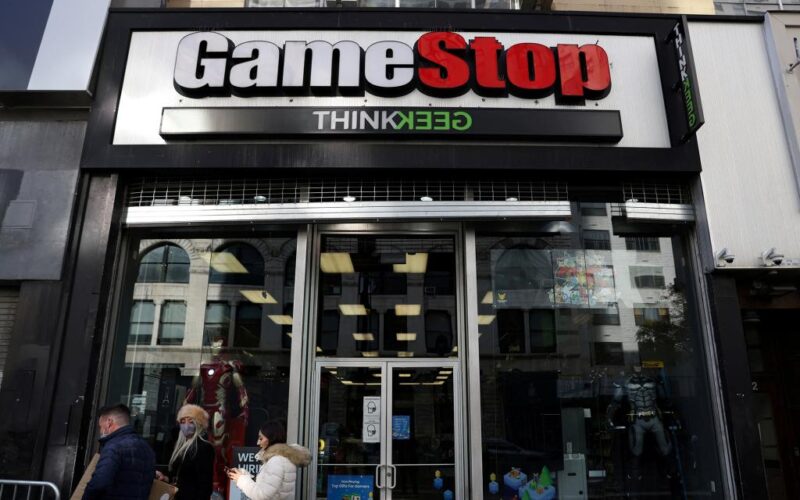I could never get my head around the bull case for GameStop, the original meme stock, that has largely defied the odds of a floundering business model and hasn’t yet crashed and burned like nearly all the others.
Last week, looking to extend this winning streak, it became a hedge fund, issuing bonds to buy crypto.
Management is betting perhaps that the Trump administration’s love of the digital coin on top of crypto speculation will help more people forget the vicissitudes of its real business, and shares would fly.
In the past, it would have done just that, but this time investors smelled some desperation.
Bitcoin might be the most popular digital coin, but it’s also highly volatile; at $84,000 it’s well off its highs.
Convert sales lead to dilution for shareholders, and these shareholders have been diluted to the hilt.
Short selling commenced.
GameStop, which trades under the symbol GME, tanked 20-plus percent on Thursday following the announcement with volume about 10 times its average.
The stock extended its losses Friday.
Maybe the sell-off was part of the overall market worry over tariffs, dampened consumer confidence and inflation.
Or maybe reality has begun to set in on one of the market’s last great examples of pure irrational exuberance.
Sure, GME has the backing of a good investor and entrepreneur, Ryan Cohen, its CEO and chairman.
He’s behind the Bitcoin ploy and he also stepped into the company at a low point a few years ago and steadied its balance sheet.
(It’s become profitable.)
Shares are trading far from the penny stock levels of the other memes, that is, those that remain in business.
Still, what Cohen hasn’t done was fundamentally change GME’s business model.
Selling video games in malls (hence the name GameStop) doesn’t make you the next new, new thing, and probably never will.
GME’s video-game sales, last I checked, fell between 2023 and 2024 and most analysts aren’t that optimistic about 2025.
A Bitcoin Hail Mary
My guess is that Cohen knows about the disconnect between his still decent stock price and his business, which is why he has been culling expenses, diluting true believers’ holdings while hoarding cash, and last week throwing the Bitcoin Hail Mary by promising to sell $1.3 billion in convertible debt to allow GME to play the crypto market.
GME will always have its cultish followers who see Cohen as a savior, of course.
The stock became an icon of the 2021 meme craze so much so that a movie was made about the drama — with the retail meme crowd playing a starring role.
Recall how they bought shares en masse, sending the stock to such astronomical levels that a short-selling hedge fund went toes up.
But the stock market of 2025 isn’t what it was for a variety of reasons, including a Fed that isn’t printing money, and the absence of COVID stimmy checks that the meme crowd used for speculation.
Until GME’s nosedive this past week, shares have had their highs and lows, but overall they’ve largely flatlined for three years, hovering around the $30 mark.
Keith Gill, the “Roaring Kitty” and patron saint of the GME memesters (he was played by Paul Dano in the movie “Dumb Money”), peeks his head into the GameStop tent now and then with cryptic comments that jazzes up the base.
The spike is often short-lived and shares return to where they started.
We’re in a seller’s market now, with fundamentals looming more important than meme hype.
The selling of $1.3 billion convertible debt that can revert to common stock isn’t just a crypto play given the market sentiment.
It’s called wild speculation through dilution, another 46 million shares of stock floating around the market so GME can hold something that could go down just as fast as it goes up.
Stuff like that forces investors to ask simple questions, like why is Cohen rolling the dice on Bitcoin if his video-game business is so good? It also forces them to look at valuations.
GameStop trades at a P/E of 65, which is about three times higher than the average stock in the S&P, and that’s after GME fell from its 2021 highs.
I suspect memesters in GME will continue to have more staying power than those others, like AMC Theatres (now deep into penny stock territory), because of Cohen and because the stock is still very green when you isolate a 12-month chart.
But — and this is a big but — the company is asking a lot from them. An equity payout in the not-so-distant future is a tall order.
Who knows what the mall-driven video-game business will be like, or whether Bitcoin will still be the most popular crypto, or whether crypto — which critics say has no underlying value but speculation — will even be around.
DEI on the defensive
A group of red-state financial officials is looking to put the final nail in the coffin of DEI hiring by applying pressure not just on Wall Street firms themselves, but also the Securities and Exchange Commission.
Teuta Dedvukaj of Fox Business reported two dozen officials from the State Financial Officers Foundation (SFOF) are calling on key players in the capital markets — big asset managers, proxy advisers and Wall Street’s top cop — to begin raising concerns that there are financial risks in employing dubiously legal Diversity, Equity, and Inclusion policies.
SFOF CEO OJ Oleka said he has yet to receive responses, but will let us know when he does.








